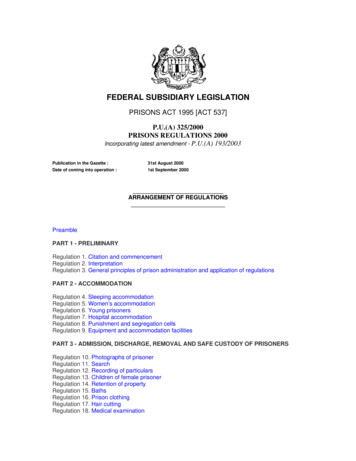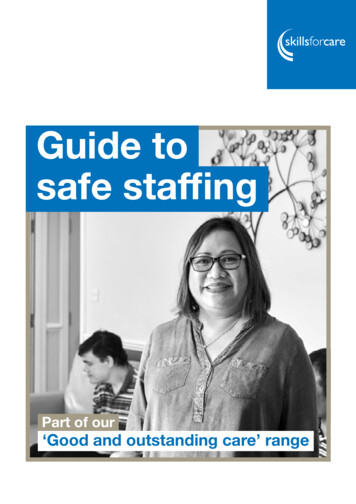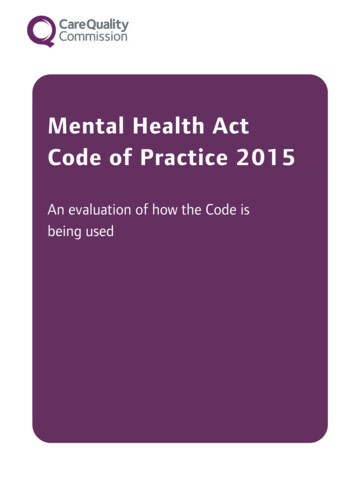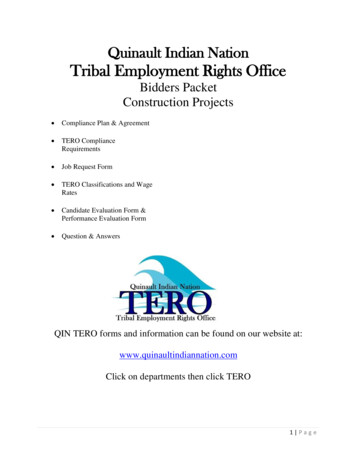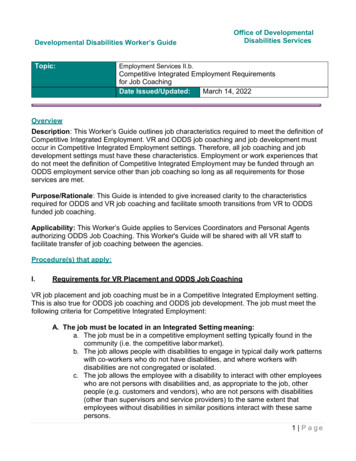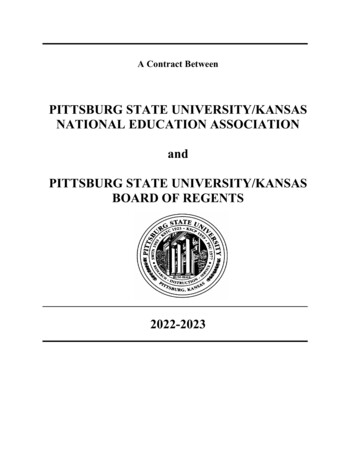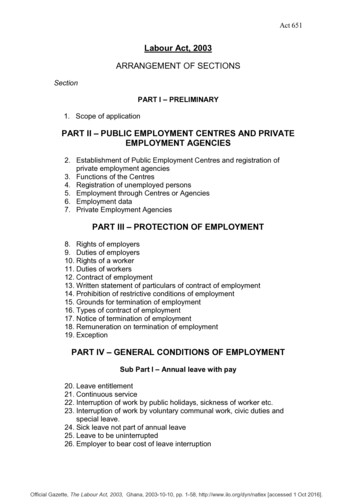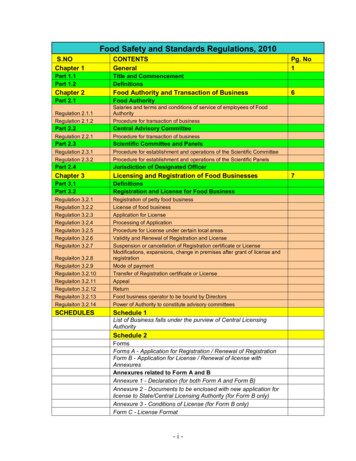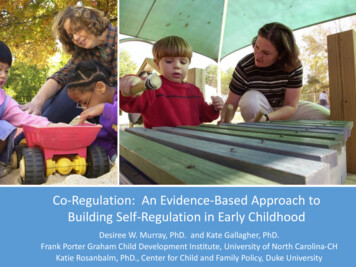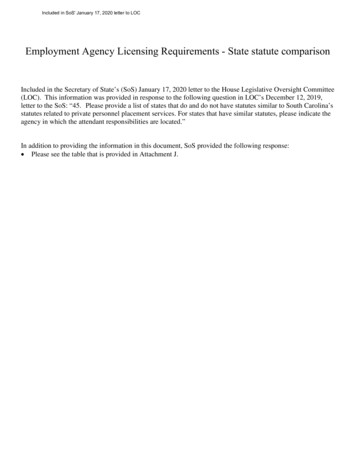
Transcription
Provider and CQC Inspector FAQs for meeting CQCs requirementsof employment for Regulation 19Regulation 19(3)(a) of the Health and Social Care Act (Regulated Activities)Regulations 2014 requires providers to make available to CQC the information setout in Schedule 3.CQC Inspectors may ask for this information at any time in relation to each “personemployed for the purposes of carrying on a regulated activity” (see Regulation 19(1).“Person employed” will include any member of staff who currently works in theservice including agency, bank staff and volunteers (based on the broad meaning of“employment” set out in Regulation 2, which extends the scope to those engagedotherwise than under a contract).The provision that the person is employed “for the purposes of carrying on aregulated activity” is likely to mean that the information will be required for themajority of (if not all) staff, including those who do not come into direct contact withservice users.The FAQs below have been written to help providers and inspectors to understandwhat is required to meet Regulation 19. These changes came into force on 1 April2010 under Regulation 21(b) of the Health and Social Care Act 2008 (RegulatedActivities) Regulations 2010, and apply to all providers registering or registered withCQC from that date.CQC has committed to developing and maintaining an open, transparent andchallenging relationship with providers. The approach to inspection starts by lookingfor good practice and encouraging improvement. This guidance is not meant to steerinspectors away from looking for “good” as they will still apply a proportionate andrisk based approach when inspecting under this regulation.Q1. What is covered in Schedule 3 and what information is needed for eachone?Schedule 3 sets out eight categories of information required to be kept by providersabout all persons employed in the provision of services.Inspectors do not need to look at all eight types of information at every inspection,but they do need to be assured that providers have this information. So, ifinformation is received that concerns CQC, the inspector may ask to see and reviewas much as they deem necessary.Type of information requiredExplanation1. Proof of identity including a recentphotograph.A photograph will not be accepted as“recent” if the staff member can’t berecognised from that passport photograph1 Page201800608 9001403 FAQs CQCs requirements of employment for Regulation 19 v1 03
anymore (for example, they have since hadplastic surgery).A new photograph would not be required fora slight change of appearance - for example,dyeing hair or growing a beard.2. Where required for the purposes of anexempted question in accordance withsection 113A(2)(b) of the Police Act 1997,a copy of a criminal record certificateissued under section 113A of that Acttogether with, after the appointed day andwhere applicable, the informationmentioned in section 30A(3) of theSafeguarding Vulnerable Groups Act 2006(provision of barring information onrequest).3. Where required for the purposes of anexempted question asked for a prescribedpurpose under section 113B(2)(b) of thePolice Act 1997, a copy of an enhancedcriminal record certificate issued undersection 113B of that Act together with, whereapplicable, suitability information relating tochildren or vulnerable adults.CQC expects each provider to undertake thelevel of DBS check for which a particularstaff member is eligible (see DBS websitefor information about eligibility). For somestaff this will be a DBS issued standardcriminal record check, for others anenhanced criminal records check or anenhanced check with barred list information.Providers must be able to demonstratesound reasons for not obtaining a full DBScheck before a person takes up post, andalso demonstrate they have assessed anypotential risk.AdultFirst checks are for working with adults,and should not be relied upon routinely.They are not appropriate for those intendingto work with children.Inspectors will not routinely ask to see a staffmember’s hard copy DBS check (although, ifnecessary, may do so in a particular case todetermine whether a provider is meeting theregulatory requirements). Inspectors willexpect to see that the provider is keeping arecord of the information obtained (includingwhether barred list information wasreceived) and, if a criminal record wasreported, evidence that any risks posed bythe staff member have been considered andassessed.4. Satisfactory evidence of conduct inprevious employment concerned with theprovision of services relating to—(a)health or social care, or(b)children or vulnerable adults.(This does not apply if member of staffhas not previous worked in health orThis information may be in the form of aReference from a previous employer - butneed not be.Written appraisal documentation may alsobe relied upon to demonstrate an employer’sview of an individual’s conduct.Written evidence from other persons wouldalso be acceptable if it provides informationregarding an individual’s conduct.2 Page201800608 9001403 FAQs CQCs requirements of employment for Regulation 19 v1 03
social care / worked with children orvulnerable adults)5. Where a person has been previouslyemployed in a position whose dutiesinvolved work with children or vulnerableadults, satisfactory verification, so far asreasonably practicable, of the reason whythe person’s employment in that positionended.(This does not apply if member of staffhas not previous worked with children orvulnerable adults)6. In so far as it is reasonably practicable toobtain, satisfactory documentary evidenceof any qualification relevant to the dutiesfor which the person is employed orappointed to perform.7. A full employment history, together with asatisfactory written explanation of anygaps in employment.Information may be held electronically andmust outline all relevant periods ofemployment or self-employment and theperson’s reason for leaving thatemployment. If it has not been practicable toobtain such information, a provider shouldbe able to demonstrate that everyreasonable attempt has been made toassure itself about an individual.Documentary evidence may be in the formof a certificate or could be writtenconfirmation from the awarding body that aqualification has been achieved.Providers can also check professionalqualifications and professional registrationstatus online with the relevant regulatorybody (e.g. the Nursing and MidwiferyCouncil) and should do this where a personhas stated they are on a professionalregister.A “full employment history” means a careerhistory from the age of first employment.This information may be in the form of aCurriculum Vitae but need not be.Information may be held electronically andmust outline all periods of employment orself-employment (whether or not related tohealth or social care), showing beginningand end dates, (actual or approximatedmonth and year), together with anexplanation of periods of non-employment.Individual placements within a continuousperiod of employment need not be listed.8. Satisfactory information about any physicalor mental health conditions which arerelevant to the person's capability, afterreasonable adjustments are made, toproperly perform tasks which are intrinsicto their employment or appointment for thepurposes of the regulated activity.If, after reasonable adjustments have beenmade (as described in equality legislation), aparticular health condition may neverthelessimpact on capability to perform tasks,information about that condition must bekept for the purposes of this paragraph.3 Page201800608 9001403 FAQs CQCs requirements of employment for Regulation 19 v1 03
Q.2. What approach will CQC take during an inspection?A. During an inspection, the Inspector will consider any information put forward by aprovider seeking to demonstrate compliance with the Schedule.When considering the amount of information to review, Inspectors will actproportionately and will (generally) ask for a sample of records. This may mean thatdocuments are not reviewed in relation to all 8 categories of information or thatdocuments relating to a particular category are not required in respect of everyemployee. However, inspectors may ask to review further documents as necessary.CQC Inspectors may ask providers for copies of documents (or printouts ofinformation held electronically) – if they do so, they will adopt a similar proportionateapproach to the copying of documents as they would to the review of documents. Itis not necessary for providers to keep documents in paper format. Electronic oronline evidence can also be usedThere is a range of good guidance documents for providers that cover values-basedrecruitment, appraisal, development and disciplinary actions. CQC expects providersto be aware of a range of guidelines relevant to their business sector, and to be ableto demonstrate that the recruitment and selection procedures are consistent withresponsible employment practice.Q.3. What if an applicant can’t remember all their previous jobs?A. If an applicant has not compiled a CV from commencement of their firstemployment, they may find it difficult to recall some employers/jobs. Anyoneseeking employment must still attempt to provide a full employment history, andmake it clear in their application where they are unable to recall someinformation. Providers should discuss/explore any gaps further with the applicantat the initial interview. CQC expects the provider to be doing this as part of theirrecruitment procedure risk assessment when this information cannot be obtained.Q.4. Do providers have to obtain evidence of conduct for every part of thecomplete employment history from applicants?A. No – only those roles which relate to health and social care, or working withchildren or vulnerable adults.Q.5. Is there a minimum requirement for the period covered by the evidence ofconduct?A. No. The provider is required to undertake sufficient checks so they can evidencethe applicant: Is of good character4 Page201800608 9001403 FAQs CQCs requirements of employment for Regulation 19 v1 03
Has the necessary qualifications, competence, skills and experiencenecessary for the work to be performedIs able to properly perform the tasks (after any reasonable adjustment)Q.6. What if the evidence of conduct only confirms dates of employment?Providers should make every effort to gain additional information about the person’scharacter, skills and experience. However, some companies/organisations will onlyprovide a statement confirming dates of employment. When this occurs, providersshould assess any potential risk and make sure the person has appropriatesupervision until they can demonstrate competence.Q.7. Do providers need to obtain full employment histories and evidence ofconduct for existing staff retrospectively?A. No. Inspectors must be proportionate about past recruitment practices, especiallywhere people were recruited many years ago. However, this needs to beconsidered case by case.If people have been recruited since the Fundamental Standards were introducedin 2014, an Inspector might ask the provider about the rationale for therecruitment practices so, if providers follow any particular good practice guidance,it would be helpful to show this to Inspectors.If providers have any current concerns about the performance, abilities, physicalor mental health of any of their staff, the Inspector will want to see what stepsthey have taken to address these, or to mitigate risks to the people who receivesupport, such as regular supervision and provision of opportunities for learningand development. This is more important than plugging employment gaps in stafffiles.Q.8. What if the checks under Regulation 19 have not been completedA. A failure to evidence safe recruitment practice is likely to result in a breach ofregulation which could affect the rating under Safe, Effective and/or Well-led.Where providers have not been able to gain appropriate evidence of conduct,they must demonstrate that every attempt was made. If these attempts are notsuccessful then providers should consider supervision options as previouslymentioned under Question 6.Inspectors will use the CQC enforcement policy and decision tree to decide whatregulatory action to take if they find recruitment practice is not safe.Q.9 How long should providers keep staff information/records?In relation to all records, providers must take into account guidelines producedby the Information Commissioner’s Office in relation to General Data ProtectionRegulation (GDPR) (including Principle E, which requires that personal data5 Page201800608 9001403 FAQs CQCs requirements of employment for Regulation 19 v1 03
shall be kept in a form which permits identification of data subjects for no longerthan is necessary for the purposes for which it is processed)CQC retains staff recruitment records for 7 years after the staff member has leftthe organisation.For those who are (or who work with) NHS providers, the InformationGovernance Alliance has published the Records Management Code of Practicefor Health and Social Care 2016. This provides, in relation to persons employed:Upon termination of contract, records must be held up to and beyond theirstatutory retirement age.Staff records may be retained beyond 20 years if they continue to be required forNHS business purposes, in accordance with Retention Instrument 122. They arenot exempt from Principle E of the [GDPR].To reduce the burden of storage and for reasons of confidentiality it isrecommended that a summary be prepared and held until the employee’s 75thbirthday or 6 years after leaving whichever is the longer and then reviewed.It can be found here in full: 166 Page201800608 9001403 FAQs CQCs requirements of employment for Regulation 19 v1 03
201800608 9001403 FAQs CQCs requirements of employment for Regulation 19 v1 03 Provider and CQC Inspector FAQs for meeting CQCs requirements of employment for Regulation 19 Regulation 19(3)(a) of the Health and Social Care Act (Regulated Activities) Regulations 2014 requires providers to make available to CQC the information set out in Schedule 3.
